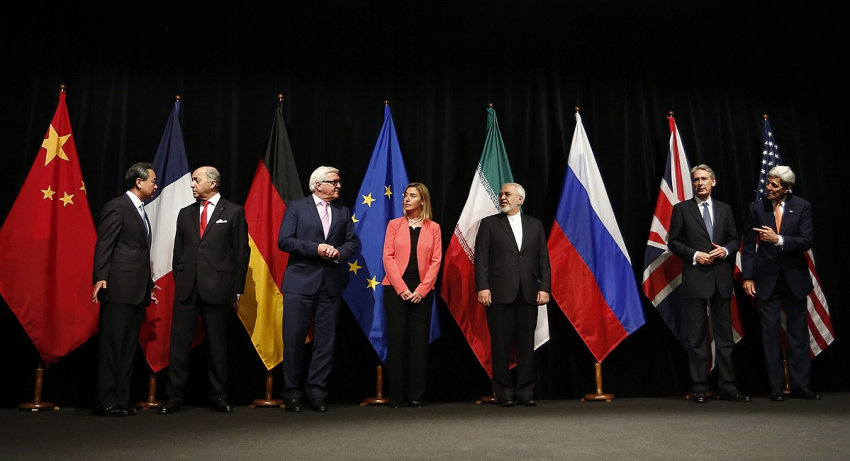Letter to the American Experts

Robert Einhorn and Richard Nephew are two former Obama administration officials who went on record repeatedly defending the Iran nuclear accord before Trump unilaterally dumped it, now singing a different tune in favor of a “new nuclear agreement” that would address the “flaws” and “shortcomings” of the agreement, known as the Joint Comprehensive Plan of Action (JCPOA).
Thus, in their new report put out by the Brookings Institution, titled “Constraining Iran’s Future Nuclear Capabilities,” Einhorn and Nephew counsel the use of “sanctions as leverage” to bring Iran into line, without once bothering with the question of legality of these sanctions. Nor do they bother with the obvious: Even if Iran agrees to ditch the JCPOPA and negotiate a new agreement with the Trump administration, what would prevent the next US president to do the same thing as Trump did; ditch the agreement and demand a new one (and more concessions) from Iran. This is a slippery slope that will have no end. This is the mindset of arrogant Westerns who view negotiations as a way to bludgeon their opponent into total submission.
According to these authors, one of whom has romanticized hegemonic US sanctions as a beautiful “art,” a new nuclear agreement would “accelerate” the “JCPOA’s timelines” and extend the enrichment-related restrictions” for “at least 15 years from the time a new arrangement takes effect. But, this begs the question of why should anyone in Iran have any listening for such “expert advises” in light of the fact that Einhorn himself once assured the Iran nuclear team, in his open letter to them during the marathon negotiations, that after a period of “around fifteen years”, the special restrictions on Iran's nuclear program during this period would be lifted and Iran would be "allowed to ramp up its enrichment capacity, including by mass producing, installing, and operating advanced centrifuges." In my response to Einhorn’s letter back then, I wrote: “With the validity basis of Einhorn's argument deeply undermined by the inherent contradiction of its underlying illogic, Iran's nuclear negotiation team should be excused if they feel less than certain about Mr. Einhorn's assurances about the West's future respect for Iran's nuclear rights. Fact is that as long as the Western governments continue to cling to the extra-legal standards that obviate the NPT norms under the guise of "breakout concerns" there is very little prospect of their turnaround from the current pattern of coercive nuclear diplomacy vis-à-vis Iran.”
In retrospect, I dare say that history has proved me right and there is now absolutely no audience in Iran for these American experts, who want to keep themselves in currency by introducing new nuances in Trump’s illegal, and discredited, Iran policy. Little surprise that they completely overlook the basic fact that Trump’s Iran sanctions and unlawful exit from the JCPOA represents a flagrant violation of international law, by virtue of defying the will of UN Security Council embedded in Resolution 2231, which calls on all member states to fully implement their responsibilities with respect to the JCPOA. Einhorn’s and Nephew’s amnesia in this regard in effect makes a mockery of their pretensions as “experts,” reducing them to mere apologists of a coercive, and illegitimate, US policy toward Iran that has inflicted serious economic pain on an entire nation. The fact that these authors try to soft paddle the US policy by suggesting vague “incentives” to Iran to come to table, compared to the more hawkish prescriptions such as a recent report put out by neocons at the Hoover Institution, matters little, particularly since Einhorn in particular has now lost credibility by reversing himself mentioned above.
The only prudent US course of action is to make a U-turn on the JCPOA exit, re-embrace it in full and implement all the US obligations under this multilateral agreement that it has co-authored. Einhorn and Newphew engage in a good deal of semantic acrobatics on whether or not their proposed new nuclear agreement should incorporate the JCPOA, thus excelling in the art of incoherence. Their ‘middle of the road’ solutions will likely fall on deaf ears in both Tehran and Washington, threading divergent paths. Trump’s Washington is sold to full demonization of Iran and is cognitively incapable of any decent “confidence-building” steps with a regime it has targeted for systematic vilification, its rupture of JCPOA triggering a long-term Iranian distrust toward US that will most likely become more entrenched as the country experiences the tumults of unjust US sanctions. Another important point overlooked by these authors, as well as whole array of other more brazen apologists of US policy on Iran, including Bret Stephens a New York Times columnist, is that the damage to US global credibility as a result of its JCPOA misbehavior represents a significant cost that belie the narrative that Trump’s confrontational Iran policy has been “cost-free.” This policy has caused a growing transatlantic rift with the European allies, who have rebuffed the US on Iran and have devised a new financial system to protect their trade with Iran, which has become politically stronger as a result of US bullying opposed by the vast majority of Iranians, whose patience is running thin and are increasingly turning their back on the JCPOA, increasingly viewed as a certificate of a great American betrayal.
Fact of the matter is that Iran has faithfully implemented all its numerous obligations under the JCPOA, deserving credit, instead of being slated for more sanctions by the likes of Einhorn and Nephew, who ought to know better the importance of US sticking with its international obligations, instead of providing lame excuses that simply do not wash with anyone, particularly in Iran. The only net effect of their report above-cited is therefore another stab at their own legitimacy, a sad yet fresh reminder of the Foucauldian knowledge/power interconnections and the servitude of American think tanks for the occupants of power in US government.

